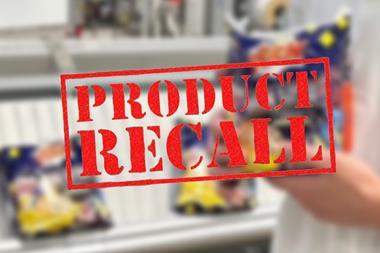
The Food & Drink Federation (FDF) has launched new guidance to help food manufacturers to reduce allergen-related incidents and recalls.
Titled ‘Allergen Recall Prevention’, the guidance sets out key considerations for food manufacturers, in particular small and medium sized enterprises (SMEs), to follow in order to prevent, manage, and investigate food allergy incidents. It outlines each step of effective allergen management so that they can be integrated into existing food safety management procedures to prevent allergy recalls.
It also highlights the processes that should be followed for each of the four main causes of allergen incidents, which are:
- Incorrect declaration of allergenic ingredients – When an intentionally used allergen is not declared or is incorrectly declared, for example isn’t in English
- Mismatch in product and packaging – When the packaging doesn’t accurately represent the product inside, for example a product in the wrong packaging or using the incorrect label
- Incorrect ‘free-from’ allergen claims – When a ‘free-from’ product in fact contains the allergen either as an ingredient or a contaminant
- Not declaring unintentional allergen presence – When ‘may contain’ hasn’t been declared on the label as required.
With a detailed overview of each scenario, the document provides a clear breakdown of their causes, and steps to prevent them from happening again, making it a valuable resource in the prevention of allergen-related recalls, the FDF said.
The Federation also highlighted the ‘significant commercial impact’ large scale recalls can have on food manufacturers, particularly smaller businesses.
The guidance was developed in collaboration with experts from across the FDF’s membership and with support from the Food Standards Agency (FSA).
“Effectively managing food allergens properly throughout all production stages is important to prevent cross contamination, and to ensure allergen information is present and provided accurately. However, we are aware that things sometimes go wrong during the manufacturing process and this may result in a food incident,” explained Darren Whitby, head of incidents and resilience at the FSA.
The FSA is typically notified of and manages around 300 allergen-related incidents each year and recommends businesses carry out risk assessments to establish how and why the problem came about.
“This new guidance published by the FDF today helps companies to identify the underlying causes to help prevent future incidents and improve food allergen management systems,” Whitby added.
There have been several bakery items recalled this year, owing to a variety of reasons – most recently Tesco recalled mince pies due to possible dry glue contamination. Several wrap and sandwiches were also recalled earlier in the year due to possible listeria risk while biscuits made by Daylesford Organic were recalled in January due to the possible presence of moth larvae.
































No comments yet